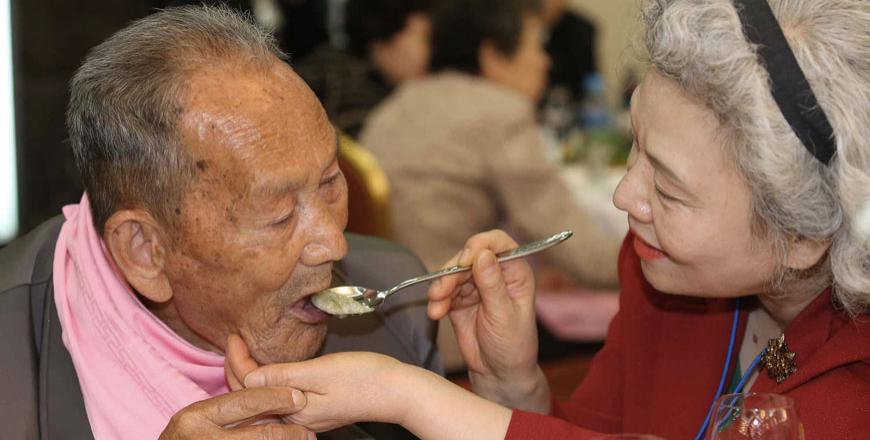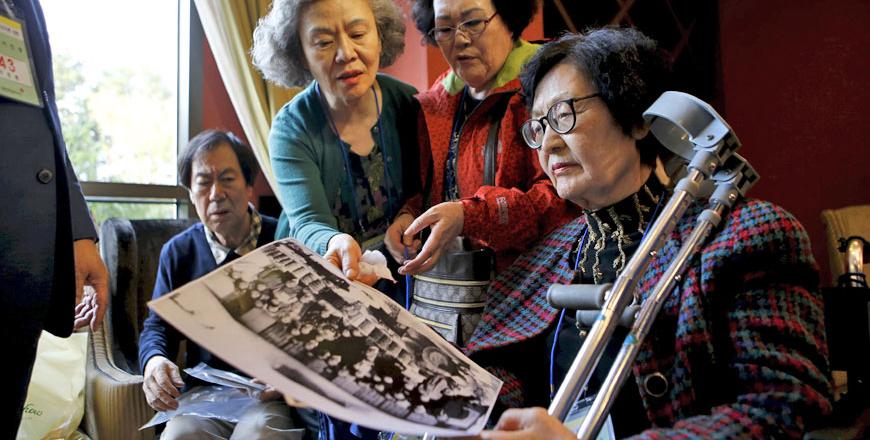You are here
Korean reunions running out of time
By AFP - Sep 06,2015 - Last updated at Sep 06,2015
SEOUL —There is a lot of sympathetic shouting going on at the call centre, with volunteers bellowing down phone lines at elderly people, checking their contact details ... checking they are still alive.
Patience is paramount, as the callers struggle to work their way through tens of thousands of names, following North and South Korea's recent decision to organise a reunion for families separated by the 1950-53 Korean War.
With logistics talks between the two rivals' Red Cross associations due to open on Monday, the pressure is on to draw up a list of possible South Korean participants in the event — expected to take place in early October.
Time, or more specifically the lack of it, has always been at the heart of the emotional family reunion process, which began in earnest back in 2000.
Initially it was an annual event, but strained cross-border relations have allowed only one reunion in the past five years.
For most of the South Koreans on the waiting list — many in their 80s and 90s — time is simply running out.
A dwindling list
Of the nearly 130,000 people who have applied for a reunion spot since 1988, more than half have since died, and the mortality rate grows with every passing year.
And with just a few hundred names making the final cut for each event, only 3,668 people on the list have actually taken part in a reunion.
In the Red Cross call centre in Seoul, the volunteers are still working through the first stage — contacting the more than 66,000 names on the waiting list.
The first priority is simply to check whether they are still alive and, if so, whether they are still willing — or indeed physically capable — to participate in a reunion if among those finally chosen.
"It's a long, arduous task, contacting that many elderly people, one-by-one, double-checking their addresses, telephone numbers and other information," said Red Cross official Woo Kwang-ho.
It also kicks off an emotional roller-coaster for those who receive the calls — raising their hopes of a meeting they have longed for but which, statistically, they are very unlikely to experience.
"We find there's a growing number of people who just don't want to know anymore. They're so frustrated," said Woo.
"And then there are many who are simply now too frail to consider participating.
"The reality is that this list will be nearly empty in a decade from now," he added.
Being selected does not automatically mean a reunion spot. First the North Korean side will have to check whether the relatives on that side of the border are still alive and willing to take part.
And even then nothing is guaranteed, as North Korea has, in the past, cancelled reunions at the last minute due to some dispute or other.
Kim Kyung-jae, 83, has waited for more than 20 years to see the younger sister he left behind in the northeastern coastal town of Bukcheong.
The third son of an affluent family who owned several fishing boats, Kim and his brothers left their hometown in 1951 as the war closed in.
Traumatic separation
"My father told me to leave and stay in a safe place for a while. I never saw or spoke to him again," he told AFP.
Because the Korean conflict concluded with an armistice rather than a peace treaty, the two Koreas technically remain at war and direct exchanges of letters or telephone calls are banned.
Kim only found out his sister was still alive in 1992 when a friend living in the United States visited Bukcheong.
He then managed to communicate with her on a relatively regular basis from 1997-2004 when his trading company posted him to Japan.
"My visual memories of my sister have dimmed a lot, but I'm still desperate to see her. That won't change until I'm in my coffin," Kim said.
His chances are slim.
For the last reunion in February 2014, a computer was used to randomly select 500 candidates, after taking age and family background into account.
That number was reduced to 200 after interviews and medical exams, and the two Koreas drew up a final list of 100 each after checking if relatives were still alive on the other side.
For the lucky ones who do take part, the reunions are hugely emotional — almost traumatic — affairs, with many of the largely elderly participants breaking down and sobbing as they cling to each other.
The events typically last several days and the joy of the reunion is tempered by the pain of the inevitable — and this time permanent — separation at the end.
"Many feel depressed afterwards because they can't maintain contact with relatives," said Shim Coo-seob, who leads an association of separated families in Seoul.
"It's time the government put a priority on securing an uninterrupted channel for the exchange of letters," he said.
Related Articles
SEOUL — Nearly 400 mostly elderly and frail South Koreans held a tearful, emotionally fraught reunion Tuesday with family members in North K
SOKCHO, South Korea — Almost 400 South Koreans — many of them elderly, some in wheelchairs, all in a state of nervous anticipation — gathere
SEOUL — South Korea has agreed to halt propaganda broadcasts at noon Tuesday after North Korea expressed regret over a recent land mine blas
















